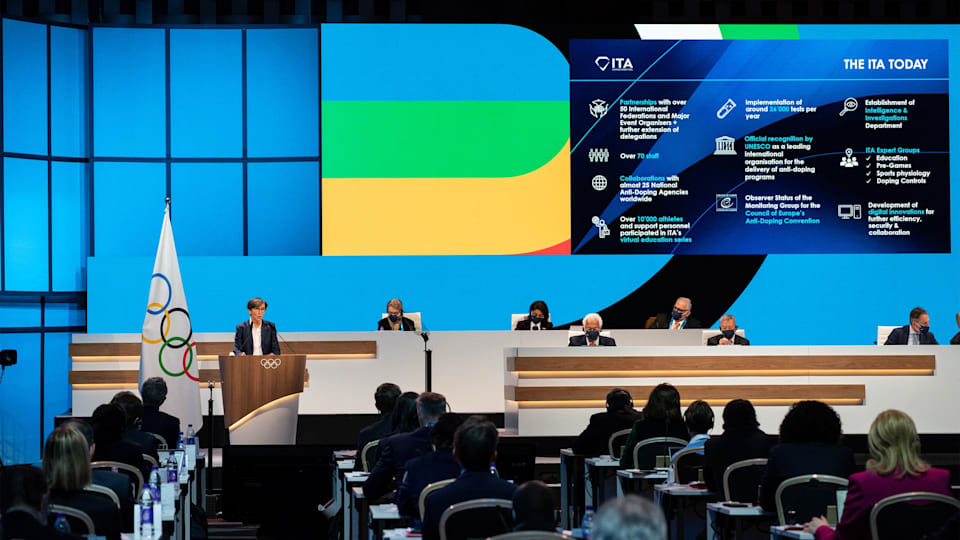Strong and independent anti-doping programme to protect integrity of Olympic Winter Games Beijing 2022
The 139th Session of the International Olympic Committee (IOC) today received the latest updates on the fight against doping, including details of the strong and independent testing programme that is in place for the Olympic Winter Games Beijing 2022.

In reports from both the World Anti-Doping Agency (WADA) and the International Testing Agency (ITA), the IOC Session heard about the rigorous testing that has taken place ahead of the Games, in order to protect the athletes and the integrity of the competitions at Beijing 2022.
Extensive pre-Games testing
Addressing the Session, the Chair of the ITA Foundation Board, Dr Valérie Fourneyron, provided a final overview of the pre-Games testing programme, which included establishing an ITA Beijing 2022 Pre-Games Expert Group that performed a systematic risk assessment on potential participating athletes from every sport.
More than 5,400 recommendations for anti-doping tests were made by the expert panel, making this the most extensive pre-Games anti-doping programme ever implemented for an edition of the Olympic Winter Games. The recommendations were then shared with the International Federations (IFs) and National Anti-Doping Organisations, and the testing programme began in September 2021. Despite complications due to the ongoing COVID-19 pandemic, 95 per cent of athletes for whom a testing recommendation was issued have been tested at least once before the start of the Games.
“This measure has added an additional layer of targeted testing to the anti-doping efforts put in place around the world,” explained Dr Fourneyron. “The ITA thanks all participating organisations for their cooperation in this joint effort to rigorously test all potential participating athletes before the Games.”
Comprehensive Games-time anti-doping programme
During the Games, both the testing and the sanctioning components of the anti-doping system will be independent from the IOC, with the ITA and the Court of Arbitration for Sport Anti-doping Division (CAS ADD) handling these respectively.
The ITA plans to collect approximately 2,900 in- and out-of-competition urine and blood samples during the Games, with its comprehensive and independent anti-doping programme featuring innovations successfully introduced for Tokyo 2020, such as intelligence-led testing based on the outcome of the pre-Games phase and a multi-factor risk assessment, a fully digital anti-doping system, custom-designed digital applications, and independent results management procedures.
“All anti-doping activities here in China will be independently planned and managed by the ITA, relying on the personnel and logistical resources of the Beijing Organising Committee and the Chinese anti-doping agency CHINADA, as well as on the support and know-how of international scientific and doping control experts, which we thank,” said Dr Fourneyron. “The out-of-competition testing programme has already begun with the opening of the Olympic Village and will continue alongside in-competition testing under the supervision and direction of the 17 ITA experts present on site. The targeting of tests will be reinforced by the exchange of information and intelligence.”
The Beijing 2022 anti-doping programme will also see a new testing method being implemented, with these being the first Games to use dried blood spot testing routinely across the testing programme, following its partial implementation for the Olympic Games Tokyo 2020.
“Dried blood spot analysis is an exciting development for anti-doping,” explained WADA President Witold Bańka. “It carries several advantages over traditional forms and will be an important complement to those established methods of sample collection. Collecting just one spot of blood per sample will make things easier for doping control officers. It will be less invasive for athletes, easier to transport and easier to store, with possible additional benefits related to sample stability.”
WADA praises Tokyo 2020 anti-doping programme
During his address to the Session, Bańka also outlined the findings of WADA’s Independent Observer programme during the Olympic Games Tokyo 2020.
“The conclusions from that report show that the anti-doping programme, as managed by the International Testing Agency on behalf of the IOC, was robust and comprehensive, and in accordance with the World Anti-Doping Code and International Standards,” said Bańka.
“This was achieved in the context of severe restrictions imposed by the COVID-19 pandemic, including the Games’ postponement by one year. I would like to congratulate and thank everyone involved for their commitment to protecting the integrity of the Games by successfully delivering the anti-doping programme.”
WADA will also have an Independent Observer team present in Beijing to monitor the anti-doping activities at the Games. The team will work in partnership with the ITA and the Beijing 2022 Organising Committee to ensure the most effective anti-doping programme is delivered.
WADA praised the pre-Games long term storage programme, which had first been implemented by the ITA for Tokyo 2020 thanks to a special fund from the IOC. The WADA President further encouraged all anti-doping agencies to make use of this free programme, which has been renewed for Beijing 2022.